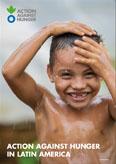
Humanitarian context
Nicaragua is the poorest country in Central America. For years, the country has
struggled with high rates of chronic undernutrition among children. Moreover,
Nicaragua is highly vulnerable to natural disasters that regularly threaten the livelihoods
of many people.
Agriculture is the main source of income for 30% of the population. However, as the
land is usually located in dry hills, harvests are often scarce. In addition, the effects of
climate change and recurrent natural disasters affect crops. This influences both the
direct food situation of families and the possibility of generating income from the sale
of products.
Beneficiaries
WORKERS
DISASTER PREVENTION
WATER, SANITATION AND HYGIENE
EXPATRIATE
NATIONAL
Our activity
At Action Against Hunger we work in those areas of the country that are vulnerable due
to their environmental and socio-economic conditions. We are currently present in the
departments of Madriz and Matagalpa, which belong to the Dry Corridor. Here we
developed the Rural Women-Led Climate Resilience programme, based on
empowerment, entrepreneurship and cooperativism.
We are present on the Northern Caribbean Coast, where our work focuses on addressing
the immediate humanitarian needs of vulnerable groups (children, young people,
indigenous peoples, women) affected by weather phenomena such as drought, floods
and hurricanes. We aim to build resilient households, capable of early recovery and/or
adaptation. Especially along the Coco-Waspam River, we implement activities to
contribute to the stabilisation of food security through food assistance, nutrition and
protection interventions in vulnerable households, promoting behavioural change,
protection mechanisms and psychosocial care.
In Bilwi and its communities, we focus on young people, preparing them for the world
of work by reinforcing their skills, knowledge and practices to set up small businesses
that allow them to develop their community while respecting cultural diversity and their
worldview.
In the north of the country, in the departments of Matagalpa and Madriz, we develop
actions to help empower of rural women and community cooperatives by promoting
agro-meteorological monitoring, with actions aimed at climate resilience with a gender
focus, working with 13 cooperatives and 753 beneficiaries.
WHERE WE HELP
We help 24.5 million people each year. We work in 55 countries in Africa, Asia, Latin America and Europe, those most threatened by hunger.
